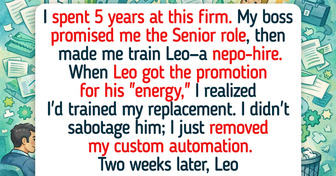Your parents are lazy plain and simple. You've done for them your entire life and yet they can't even say thank you. Let them do for themselves for once. Especially after that nasty and hurtful comment your father made.
I Refuse to Support My Aging Parents—Because I Don’t Owe Them Anything
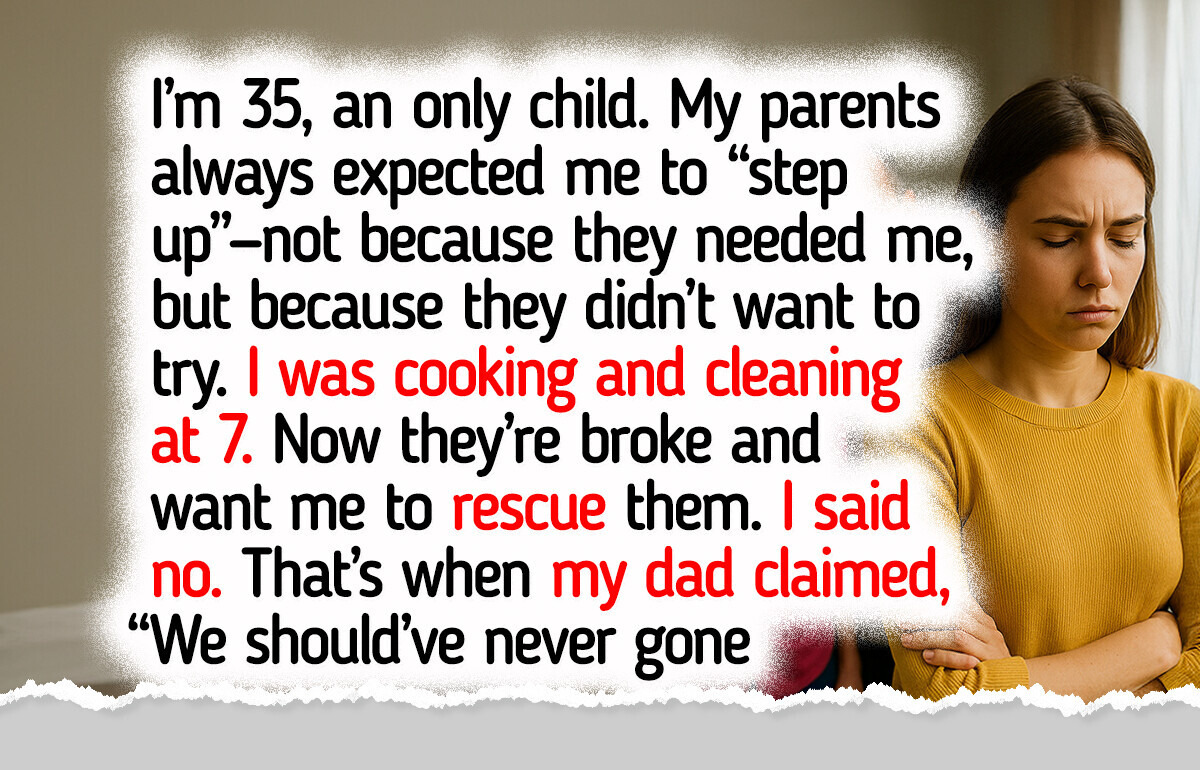
One of our readers opened up to us with a heartfelt story about finally setting boundaries with her family. After spending years as the “third parent” at home, she’s now choosing to step back—saying no to the caregiver role her parents always expected her to take on without question.
Her letter — in her own words.

"I’m 35, only child. My parents always expected me to "step up"—not because they were struggling, but because they just didn’t want to. From age 7, I was cooking dinner, doing laundry, and handling things most kids don’t even think about.
They called it “teaching responsibility.” I call it free labor.
Now they’re in a financial mess—zero savings, living on fumes—and I’m supposed to rescue them. They’ve made it clear they think I owe them.
I don’t.
They raised me with the expectation that I’d one day pay them back for doing the bare minimum. Now they’re panicking, and I’m the bad guy for saying no?
Sorry. I’m not their plan B.
That’s when my dad said, “We should’ve never gone through with the pregnancy—at least then we wouldn’t be this disappointed.”
I’ve carried enough. It’s their turn."
Thank you for sharing with us!
Parentification and signs of a parentified child
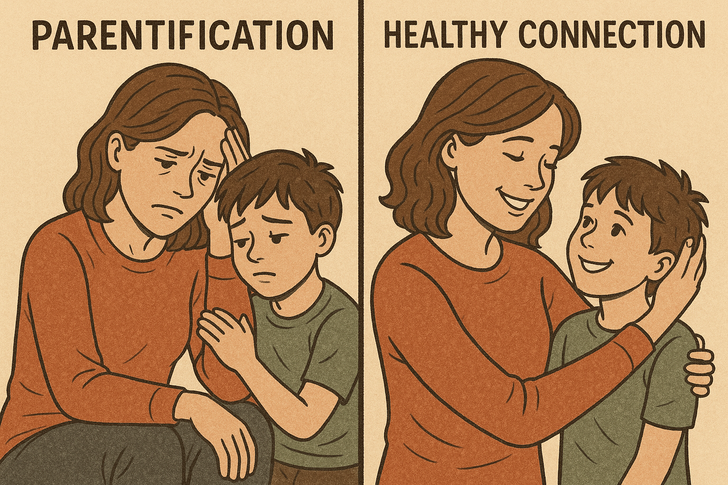
Parentification is a dynamic that occurs when a child takes on roles and responsibilities that are typically meant for adults within a family system.
Experts generally distinguish between two main types of parentification:
1. Instrumental Parentification
This involves the child being responsible for day-to-day practical tasks. These might include cooking meals, cleaning the house, managing household schedules, caring for younger siblings, or even overseeing bills and finances. In some families, especially those dealing with illness, addiction, or disability, children may also take on caregiving duties for a parent or guardian. Though these responsibilities may seem helpful on the surface, over time they can interfere with the child’s education, social development, and personal freedom.
2. Emotional Parentification
Here, the child becomes an emotional caretaker for one or both parents. They might be expected to listen to adult problems, offer advice, comfort a distressed parent, mediate conflicts between adults, or act as a substitute partner in emotional terms. This role is especially damaging because it blurs relational boundaries—the child learns to suppress their own feelings in order to meet the emotional needs of the parent.
Parentification can also be understood as either:
Adaptive: This type is short-term and usually emerges in response to a crisis, such as a family illness or financial hardship. While it’s still a burden, it can sometimes help a child develop empathy and problem-solving skills, especially if support is restored later.
Destructive: This form is chronic and becomes part of the family’s norm. The child is routinely expected to function like an adult, without acknowledgment, relief, or emotional support. Over time, destructive parentification can lead to feelings of guilt, anxiety, resentment, low self-worth, and difficulty forming healthy relationships in adulthood.

Parentification can be parent-focused (caring for a parent) or sibling-focused (taking care of siblings). It often arises due to parental illness, mental health issues, addiction, divorce, or financial stress.
When parentification is chronic, it can lead to long-term effects such as anxiety, depression, guilt, emotional dysregulation, poor boundaries, and relationship struggles in adulthood.
Warning signs in teens may include:
Constant over-responsibility
Anxiety or perfectionism
Isolation or emotional burnout
Physical symptoms like fatigue or headaches
The difference between parentification and healthy connection.
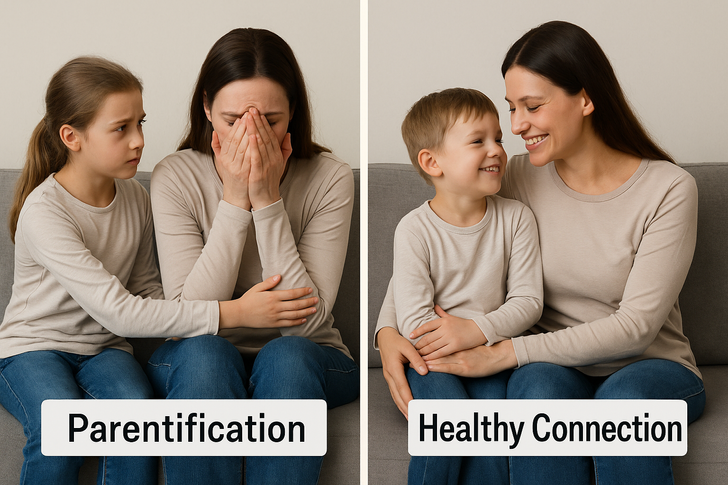
It’s completely normal—and even healthy—for parents to share age-appropriate emotions with their children. Kids often sense when something’s wrong, and honest communication can help them feel more secure and less confused.
Similarly, having children help around the house or occasionally care for siblings can build confidence and a sense of responsibility. But this support should never come at the cost of their emotional well-being, education, or social life.
The key difference? In healthy families, children aren’t made to feel responsible for a parent’s happiness or the safety of the home. Parentification crosses the line when a child is expected to be a caregiver, instead of just being a child.
Sometimes, the relationship between a parent and child can be incredibly complex — and at times, painfully difficult.
I’m Child-Free, and My Parents Chose to Leave Their Legacy to My Cousin—So I Turned the Tables
Comments
You owe them nothing. Low contact would be a good idea, but you should try to stay close enough to laugh at them when they struggle. If they wind up losing everything, try to point when you laugh.
You don't have to mean or petty like your parents continue to go on with your life and be happy. Your parents are grown and can figure out their own problems. I would go no contact no one wants negative people in their life especially after what your father said.
Related Reads
My Husband Humiliated Me on Our Wedding—Now I’m Questioning Our Future

I Canceled My Birthday When My Friends Said I Should Cover the Bill Because I’m Vegan

I Refused to Knit My Coworker a Free Blanket, and Now HR Is Involved
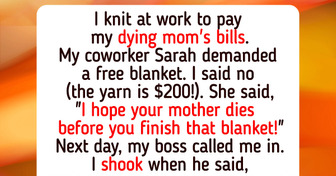
13 Stories of Quiet Kindness That Show Superhuman Strength in Ordinary People

16 Moments That Show Kindness Is the Quiet Courage the World Needs
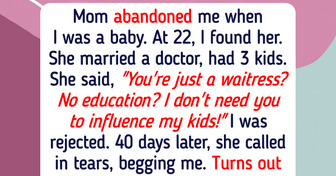
20+ People Who Prove Outsmarting Life Is an Art Form

20+ Stories That Prove Having a Supportive Family Is the Best Safety Net in the World
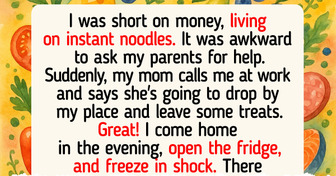
13 Teachers Who Didn’t Just Teach a Subject, They Rescued a Soul
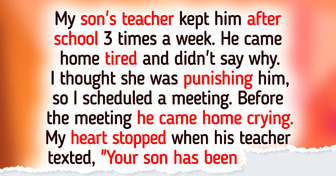
My Neighbor’s Dog Poops in My Yard, but Things Escalated Faster Than I Expected

I Refuse to Cook Vegan Meals for My Stepson—And It Turned Into a Nightmare

10 Stories That Prove Kindness Is the Backbone of Humanity
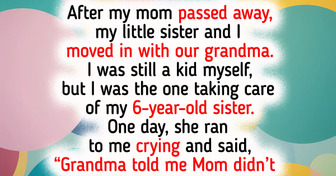
I Trained the New Hire Who Took My Promotion—My Revenge Was Calculated
